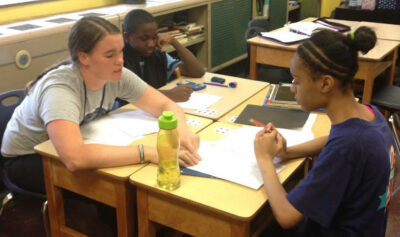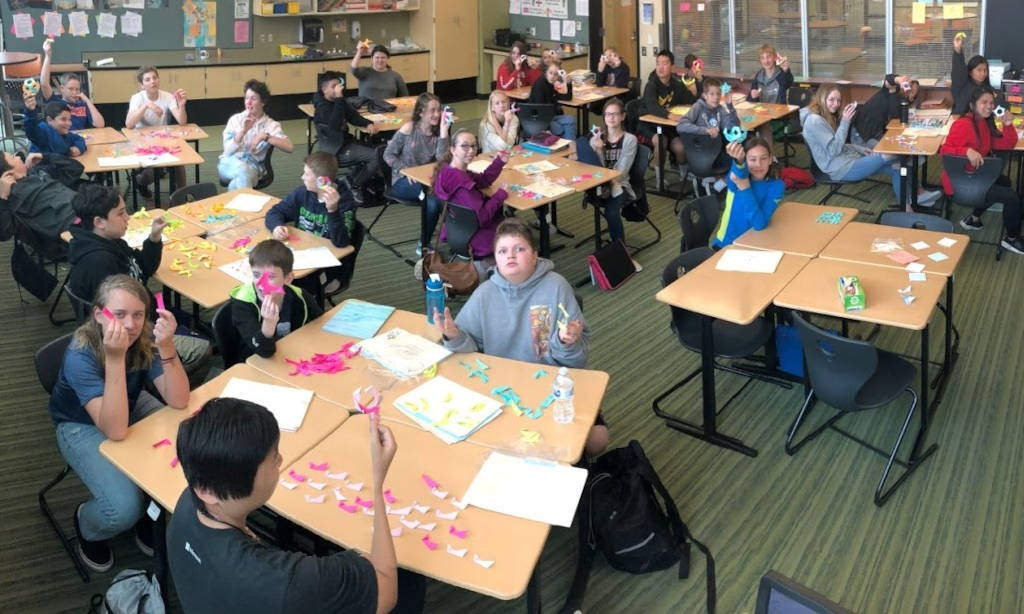DATE
June 30, 2025
AUTHOR
Kaaren Hatlen
CATEGORIES
Restorative Practices
SHARE
I was teaching scientific notation to my 8th grade math students when the inevitable question that gets asked of all math teachers was asked: “When am I going to use this?” Ready and waiting for this question, I launched into my prepared answer: “Well, when you read a calculator and you see “E” in the answer with other numbers you need to know that the “E” is scientific notation, not an error. Scientists use it to measure really large numbers like distances in space, and really small numbers like the size of microscopic items. pH and Richter scales are based in exponential/logarithmic scales.”
The phrases commonly heard in a math classroom are “When am I going to use this?” and … “I am not a math person”
For my student who wanted to be an NFL football player, those answers were not satisfying enough.
The phrases commonly heard in a math classroom are “When am I going to use this?” and a version of the phrase “I am not a math person.” A teacher could view these comments as negative (frustrating, annoying, toxic), but the reality is that these comments are student voice. These are teachable moments that lead to student empowerment and student ownership when acknowledged and channeled for good. These phrases are why I chose to become a math teacher. I wanted to always have an answer to the first question for my students and abolish the second statement.
“When am I going to use this?” Sometimes when a student asks this it is sarcastic, but most of the time it is genuine, either coming from a place of frustration with the content and trying to determine if it is worth the effort to figure it out or coming from a place of genuine curiosity. It is important to truly hear students and where their voice is coming from.
In your academic future. When I first started teaching, my answer to this question was often what topic this led to in the student’s next year’s math class, the ACT, or college. During one RPIA session, I realized that this is the education system as it is, so students need to check this box now so that they can be prepared to check the next box next year. RPIA showed me that while this can still a part of my answer to students because the education system still is not perfect, students can also be empowered to succeed within the current system while owning the ways in which they can change it. RPIA taught me to reflect on this question: how can the students before me change the way the system works and the how academic success is seen in the future?
 In your occupational future. Certain topics in math lend themselves to different professions. Architects need geometry, physicists apply Calculus, animators use trigonometry, just to name a few. Students will say, “I am never going to be an insert occupation here” to which my response is, “I am not going to be the one to decide that.” As their teacher, I am going to make sure every student gets the mathematical knowledge and the problem-solving skills to so that they are empowered to make their own choices in the future.
In your occupational future. Certain topics in math lend themselves to different professions. Architects need geometry, physicists apply Calculus, animators use trigonometry, just to name a few. Students will say, “I am never going to be an insert occupation here” to which my response is, “I am not going to be the one to decide that.” As their teacher, I am going to make sure every student gets the mathematical knowledge and the problem-solving skills to so that they are empowered to make their own choices in the future.
In your future. Students do not have to use math ever again in their lives, but this knowledge is empowering when applied. In shopping for the best price (percentages), cooking and baking (fractions), loans (exponents), home and garden (geometry), travel costs (rates), and so many other ways, math empowers students to be more efficient, save money, and be independent.
You tell me! This is where RPIA really challenged my thinking. In my first year of teaching, I thought that I always had to have the answer. But the truth is, students have many of the answers inside themselves and within each other, and now turning questions back on students is my favorite thing to do in the classroom. This does not happen overnight, but rather through the process of building a class culture. RPIA’s program develops teachers who ensure students have the responsibility to find the direct application of the content in their lives or apply the larger life lessons learned into who they are as people.
But the truth is, students have many of the answers inside themselves…turning questions back on students is my favorite thing to do in the classroom.
I am not a math person. I talk about this a lot in my staff meetings and have had two coworkers tell me that they no longer use this phrase because of the damage it can cause. By the time students enter my classroom, they have had at least 8 years in a math classroom. Depending on the experience, they may have never felt successful, always been confused, or even worse, been defeated. For my students with this paradigm, this is what we work to undo in our year together. Students are empowered to voice their strategies, own their creative approaches to the problem, and see themselves as a part of the classroom and problem-solving process. The key is empowering student voice so that when students go into future classrooms and future settings, they can own who they are and make contributions.
You are a math person and you can use math in your life.


